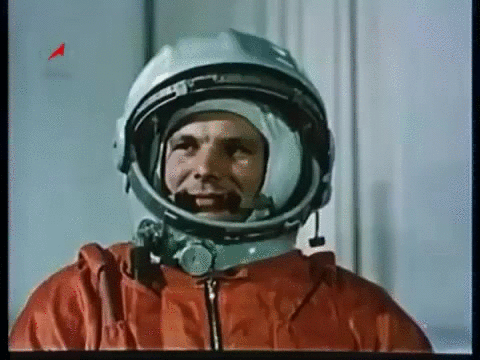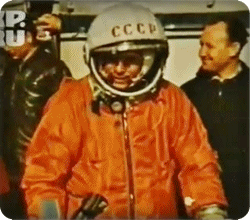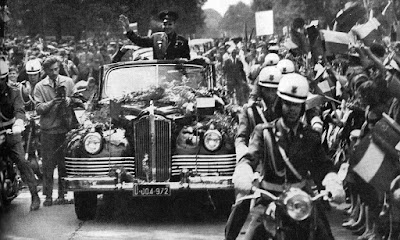Today (March 9, 1934) is the birthday of Yuri Gagarin, the first astronaut to have successfully fly into space.

Yuri Gagarin (Yuri Alexeiwick Gagarin)
was born on March 9, 1934, in Kazakh, Klusino, Russia. Gajatsk, where he was
born, was named after him after his death as ‘Gagarin’. The third of four
children was Yuri Alexievich Gagarin. Born in a small village about a hundred
miles from Moscow. As a teenager, Gagarin saw a Russian yak fighter jet make an
emergency landing near his home. A few years later, when the opportunity to
join a flying club came, he eagerly accepted it. In 1955, he piloted his first
solo aircraft. Within a few years of that, he made efforts to improve himself
as an astronaut. More than 200 Russian Air Force fighter pilots were selected
as competitors. Experiences in coping with high-stress conditions were also
considered as reasons for their selection.

Lt. Gagarin, a 27-year-old senior
lieutenant at the time, was one of the selected pilots. Let's look at the
problems we face in this age of travelling in space, which we consider to be
well mastered. The first problem is anatomy. Our body needs to be able to
withstand the pressure and vibration that occurs when it is pushed against the
force of gravity. Within hours of the spacecraft leaving the spacecraft, there
was a risk of an explosion due to technical problems. Beyond that, the pressure
exerted by the ‘escape velocity as it passes through our atmospheric layer,
and overcoming that, the magnetic field of the Earth with the energetic
particle material ‘Van Allen Radiation Belt’, then travels back into space as
the reception of vacuum takes rebirth.

On April 12, 1961, at 9:07 a.m.
Moscow time, the Vostok 1 spacecraft took off from a Soviet launch site. How is
the weight loss due to propulsion going to affect a pilot, i.e. can the pilot
properly control the spacecraft at that level of vibration and pressure? Since
no one knows for sure, the spacecraft was designed to operate automatically
within the spherical envelope he was on, or to operate from ground level. Perhaps if something went wrong with the spacecraft, he was allowed to
take control of Goger's spacecraft and obtain an override code from the ground
control platform. However, the then-chief designer of the Soviet space program,
Sergei Korolev, violated the rules and gave the code to Gagarin before he
boarded the spacecraft. Probably a factor as to why they're doing so poorly and why they're waiting 10 days for Gagarin to get the food and water he needs,
when the engine is malfunctioning and waiting for it to start spinning
naturally in orbit. But Gagarin did not need those items.


In 108 minutes, Vostok 1 orbited
the Earth for a full orbit and reached a maximum altitude of about 203 miles
(327 km). When Gagarin returned to Earth and re-entered Earth's atmosphere, he
sought to remain as conscious as possible. Then, he realized that the tensile
force of gravity was eight times greater there. When it returns to Earth, the
Vostok 1 spacecraft does not have the engines needed to run the spacecraft
slowly or any means of landing safely. At an altitude of 7 km above the ground,
he exited the spacecraft and landed by Gagarin's parachute. The Federation
Aeronautical International (FAI) had stipulated that an astronaut could only be
considered an authorized astronaut if he landed with the spacecraft. Soviet
leaders announced that they had landed with Gagarin's spacecraft until 1971. In
any case, no one can deny that Gagarin was the first person to escape from
Earth's orbit and travel in space.

Gagarin, on his return from space, became famous as the hero the world celebrates. He was greeted by hundreds of thousands of people in Moscow's Red Square. Recognizing the Soviet record, Gagarin toured the world. When he returned to Russia, he was promoted to the post of Vice-Chancellor of the Soviet Union, the largest office in the Soviet Union. He was also appointed commander of the Astronauts Division. The Soviet government did not want to send Gagarin back into space, as his life was so important that Gagarin was well known to the public. But he was also working on building test aircraft in the Air Force.

April 12, Gagarin's space trip,
is remembered as a special date. This day has been celebrated in the Soviet
Union since 1962 and later in Russia and some other countries that seceded from
the Soviet Union. In 2011, this day was declared the United Nations
International Day of Manned Spaceflight. Since 2001, Yuri
has been celebrated every April 12, marking the last day of a milestone in
space exploration. Many buildings and other sites on earth are named after
Gagarin. In 1969 the Astronauts Training Center in Star City was named after
Gagarin. The Baikonur spacecraft launch site is named after Gagarin, the launch
of Gagarin. The city of Sevastopol in Ukraine was named in memory of Gagarin
during the Soviet era. The Air Force Academy (Corporation) was renamed Gagarin
Air Force Academy in 1968.

His name is placed on a moonlit
valley by astronauts and astronomers in honour of Gagarin. Astronauts Neil
Armstrong and Buzz Aldrin, who flew to the moon aboard the U.S. space program
Apollo 11 in 1969, have left a commemorative bag with medals on the surface of
the moon in memory of fellow astronaut Vladimir Komarov Gagarin. In 1971, the
Apollo 15 astronauts left a list of the late astronauts David Scott and James
Irwin at their landing. This list contains the names of all American astronauts
and Soviet astronauts who died in space racing. It listed Yuri Gagarin as the
14th person.
Statues of Gagarin have been
erected in many places in his honour. One of them is a statue of Yuri Gagarin
that was finally installed in 2011 near the Admiralty Arch in London (now
Greenwich), in the London Trade Center. In 2012, a statue was unveiled at the
site of NASA's original space headquarters on South Wayside Drive in Houston,
USA. The sculpture, made in 2011 by artist and astronaut Alexei Leonov, was
presented to Houston by various Russian organizations. The statue was unveiled
by Houston Mayor Annie Parker, NASA Administrator Charles Bolden and Russian
Ambassador Sergei Seok.
On March 27, 1968, during a test
flight of a MiG-15 jet fighter, Gagarin was killed along with fellow pilot
Vladimir Sorokin. At the time, he had two children. The State Commission
investigating the crash said that the jet had crashed into the
ground, suddenly manoeuvring the plane to avoid a collision with a
bird or something else. In the seven years since he reached the peak of his
fame, Gagarin would not have even dreamed that he was going to die. His
achievement will remain remembered as long as this period exists in the
human race.
Information: Dr. P. Ramesh, Assistant
Professor of Physics, Nehru Memorial College, Puthanampatti, Trichy.


.png)
.jpg)
No comments:
Post a Comment